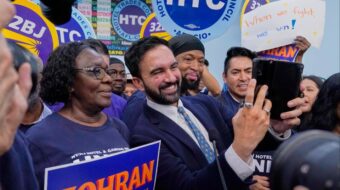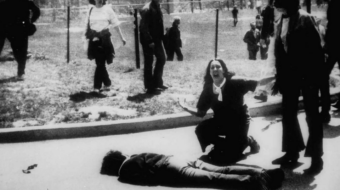
DETROIT —Riding a wave of reform after a massive corruption scandal and resentment of a two-tier wage system at the Detroit 3, Shawn Fain, nominee of the Unite All Workers for Democracy (UAW-D) movement, narrowly defeated incumbent Ray Curry for the United Auto Workers presidency.
His win completes a UAW-D/UAW Members United sweep of contested races for the union’s top jobs in its first-ever one-member one-vote election and ends the 77-year reign of the Administration Caucus—a self-perpetuating group—atop the historic and influential union.
“A Fain victory is the difference between solidarity unionism—rank-and-file unionism—and the company unionism that we’ve been experiencing in the UAW for several decades now,” tweeted Scott Houldieson of Chicago’s Ford plant on the South Side, a leader of “@UAWD Reform.”
“For too long, the UAW has been led by corrupt leaders who care more about the company than the membership,” Fain’s runoff campaign brochure said. “We must elect a new president who will serve notice to the companies that we will fight for our jobs, whether we’re in Ford, GM, Stellantis (FiatChrysler), IPS, TOP, Agricultural Implements, Higher Ed, Gaming, or any other sector.”
The Auto Workers’ official website was silent on the results, but vote tallies UAW-D posted, gathered by monitors at the independent vote counting site, showed Fain led Curry by 505 votes, 69,386-68,881. Approximately 600 challenged ballots remain to be counted, news reports said.
But those same tally sheets show that if all challenged ballots are allowed, Curry would gain between 105 and 134 votes, net, not enough to overturn Fain’s victory.
Curry himself seemed to recognize he was losing. Just before the March 16 count, he challenged the outcome. His March 15 complaint alleged irregularities. He demanded a rerun of the entire balloting. The independent election monitor turned him down.
Fain, of Kokomo, Ind., joined UAW in 1994 as an electrician in a Chrysler auto parts plant. He’s a veteran negotiator including in two national contracts, and shop steward. But also—as a member of UAW-D—he’s challenged the union’s hierarchy.
Fain’s election is important to the entire labor movement for several reasons, both within and outside the UAW:
- It’s a manifestation of worker hatred of the two-tier wage systems, a divide-and-conquer method bosses have imposed on workers for at least the last 20 years. Fain made the abolition of two tiers his key platform plank—and one that will be vital at UAW’s upcoming special Bargaining Convention, which starts March 27.
“What impressed me most about Shawn was that he had the courage to take on the entrenched administration that was surrounding him at work every day,” Houldieson, a UAW-D co-founder, told the Detroit News.
“Also what impressed me with Shawn was the fact that he was solidly opposed to the tiered wage and benefit structure that we’d been fighting for so long in the UAW. He had a record of fighting against it when it came into being.”
Hatred of two-tier wages among the 325,000 Teamster union members at United Parcel Service—who toil in the nation’s largest private-sector contract—also propelled Sean O’Brien’s landslide Teamsters win just over two years ago. In tweets, UAW-D thanked Teamsters for a Democratic Union, the insurgents who propelled O’Brien’s victory, for their aid in strategy and messaging.
Both that UPS contract and UAW’s contracts with the Detroit 3 expire this year. O’Brien has been touring the country preparing his Teamsters for a potential strike over two tiers. And Fain told a Detroit TV interviewer in December that strikes by UAW are not out of the question.
- Fain’s and O’Brien’s wins, plus the ouster of the president of the Brotherhood of Locomotive Engineers, a Teamsters sector, shows the increasing militancy of workers—exemplified by the Amazon Labor Union and Starbucks Workers United—is not confined to younger people.
BLE President Dennis Pierce lost to a rank-and-file locomotive engineer because Pierce was too close to management during the fracas over paid sick leave which preceded the recent congressionally imposed freight railroad contract settlement.
Similarly, the Administration Caucus was perceived as too close to management, even without the collusion/bribery scandal between top UAW leaders and FiatChrysler.
The scandal led to the first-ever direct election for UAW international officers and regional directors, which will be a permanent change. It came as a result of the Justice Department’s investigation into financial corruption at the top levels of the union. Former presidents Dennis Williams and Gary Jones were convicted of fraud and sentenced to prison along with nearly a dozen other officers and staff reps.
The federal monitor ordered the union to hold a referendum on whether to keep the old method of electing top officers by convention delegates or have a one member one vote. That narrowly passed.
- The latest example of closeness UAW-D criticized came March 12. Curry praised Ford’s new electric vehicle battery plant to be built in Marshall, Mich., with a state tax break—and without any guarantee the plant’s workers would be on the first tier of wages, not the second tier firms use for parts suppliers. Curry also said there would be card-check recognition at Marshall, not automatic inclusion in the union.
“As the transition toward electric vehicles accelerates, we are seeing more and more how corporations are using it to divide workers and weaken unions,” UAW-D said.

“In response, the UAW, under the leadership of President Ray Curry and the Administration Caucus, continues to reveal their strategy for the electric vehicle transition is to give the companies what they want.” The union’s leaders are “parroting management’s talking points” about jobs. “It’s time for a real worker-led strategy for the EV transition.”
In an In These Times interview with veteran labor writer Steve Greenhouse, Fain also said there would be a new bargaining strategy, driven by the members and involving plants at all of the Detroit 3, including strikes that won’t be for show only. Fain did not divulge details, and UAW-D invited all 400,000 union members to participate in the convention, via Zoom.
Fain also said that a key part of the bargaining strategy of the union will be to forge close ties with the communities in which plants are located. He noted that arbitrary actions by the companies can and do seriously harm communities and he pointed to the recent closure of the UAW-represented plant in Belvidere, Illinois, as an example of how a closing hurts not just workers but entire communities.
Fain also told Greenhouse that it’s time to hold politicians, as well as union leaders, accountable. Labor, he said, should not be totally tethered to the Democratic Party, especially if the Democrats brush aside workers’ demands, as happened during the railroad contract mess. Essentially the government removed from the workers their right to collective bargaining in that dispute.
The looming start of the bargaining convention prompted former UAW President Bob King, now a respected elder statesman, to urge the election monitor to certify the results quickly and “swear in the next president.”
“It is my hope all candidates will take the high road and encourage everyone to come together in unity to get the best possible contracts for our members in every sector,” King said.
Steve Noffke of People’s World contributed material for this story.
We hope you appreciated this article. Before you go, please support great working-class and pro-people journalism by donating to People’s World.
We are not neutral. Our mission is to be a voice for truth, democracy, the environment, and socialism. We believe in people before profits. So, we take sides. Yours!
We are part of the pro-democracy media contesting the vast right-wing media propaganda ecosystem brainwashing tens of millions and putting democracy at risk.
Our journalism is free of corporate influence and paywalls because we are totally reader supported. At People’s World, we believe news and information should be free and accessible to all.
But we need your help. It takes money—a lot of it—to produce and cover unique stories you see in our pages. Only you, our readers and supporters, make this possible. If you enjoy reading People’s World and the stories we bring you, support our work by donating or becoming a monthly sustainer today.










